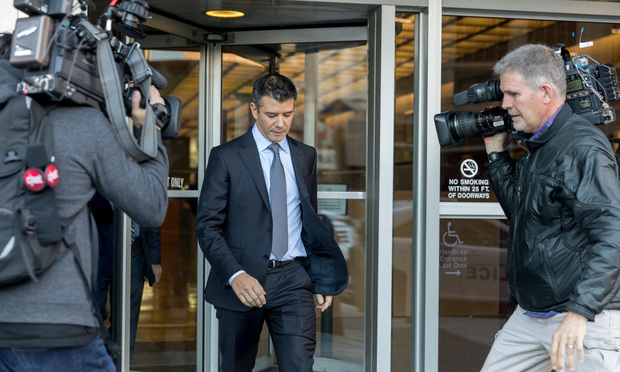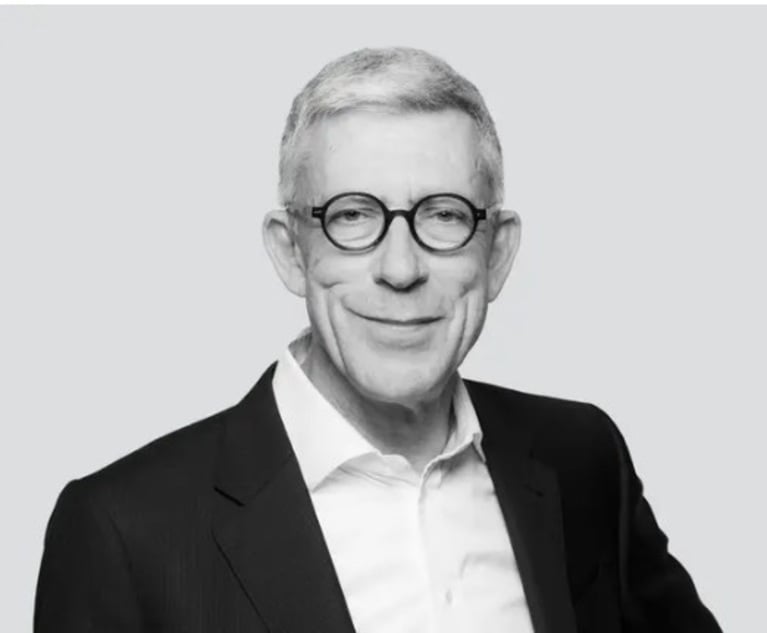When CEO Resignations Put Law Firms in the Hot Seat
The aftermaths of corporate ousters at Uber and Wynn Resorts highlight the turmoil outside law firms can face when a client's CEO goes down.
March 15, 2018 at 06:57 PM
5 minute read

Outside law firms can be among the first casualties—or at least find themselves suddenly vulnerable—when corporate boards oust their CEOs for alleged misbehavior and then engage in mop-up operations.
And even if a firm ultimately keeps its client, there's no denying the turbulence in the wake of such exits.
“The board or whoever is cleaning things up needs to shift responsibility from their being in the crosshairs to somebody else who had some colorable duty to watch out for things, and a major outside law firm is an obvious target,” said Bruce MacEwen of the New York-based consulting firm Adam Smith Esq.,
Take Uber Technologies Inc. and Wynn Resorts, two companies that bid farewell to embattled CEOs in recent months. In Uber's case, the ouster of Travis Kalanick was followed by a shake-up in the defense team in the company's high-profile trade secrets battle with Waymo over driverless car technology. Wynn Resorts, meanwhile, replaced its legal team at O'Melveny & Myers shortly after Stephen Wynn resigned as CEO under a cloud of sexual misconduct allegations.
Kalanick, who announced this month that he would start a new investment company, stepped down as Uber's CEO last June. Four months later, the ride-hailing company's board of directors recast the company's defense team by hiring Bill Carmody from Susman Godfrey to lead its battle against Waymo—an unexpected turn for the two firms, Boies Schiller Flexner and Morrison & Foerster, that were already litigating the case.
The litigation settled last month when, after one week of trial, Uber agreed to give Waymo a 0.34 percent stake in the company valued at $245 million.
“When we did parachute into this case, it's fair to say it was a surprise to management and the other two outside firms, and it happened just 60 days or so before the original trial setting,” Carmody said. “Their feeling was, 'We don't need any help. It will be an unnecessary drain on the initial people.'”
But in the end, he said, “Everybody brought something a little special to the table. At some point, egos left the room.”
“There was some skepticism,” Karen Dunn, a partner from Boies Schiller, said about the need for Susman Godfrey to be added to the team. “'Is this really necessary,'” was a question people asked, she said, but added, “Very quickly everybody rose to the occasion.”
The decision by a subcommittee of Uber's board to hire Susman Godfrey appeared to be “less about 'This is going badly' and 'you've screwed this up'” and more about wanting the best defense available, said one lawyer familiar with the decision. The move nevertheless caught Uber's legal department by surprise, according to the same attorney. “There was a period when Travis wasn't CEO and no one was CEO, and there was not a lot of deference to the administrators of the company,” the lawyer said.
Given the sprawl of the litigation—a bet the company case for Uber—there wasn't a question of Susman Godfrey fully taking over the case, Carmody said. “It was too big,” he said.
Ultimately, “in a tense situation, a respect grew,” among the defense firms, Carmody said. He recognized the MoFo lawyers knew “the tech part of the case better than we ever could,” he said. Boies Schiller's Dunn's preparation of Uber's colorful former CEO—a key witness at the trial, who was on the stand for the two days prior to the settlement being announced—was pivotal and expertly handled, Carmody said.
At trial, two lawyers from each of the firms had assigned speaking roles. The cooperation led to the best result for the client, lawyers from all three firms agreed.
“It definitely ended up as a very strong team effort. I've always found it exciting to practice with really great lawyers and we had that opportunity here with each of the firms,” said Michael Jacobs, a MoFo partner.
None of the lawyers would disclose details about the confidential settlement. But it ended litigation that could have been the beginning of dozens of additional trials over Waymo's potential claims related to dozens of alleged trade secrets. It also gave Waymo an equity interest in Uber—a deterrent to future suits.
Far from the Bay Area, meanwhile Wynn Resorts in Las Vegas spent the early winter grappling with multiple allegations of sexual misconduct by founder Stephen Wynn, first reported in January by The Wall Street Journal.
On Feb. 2, the board announced it had hired O'Melveny & Myers to assist its special committee of independent directors.
But two weeks later, following Wynn's resignation as chair and CEO, the Wynn Resorts board terminated O'Melveny's contract and announced it had hired Gibson, Dunn & Crutcher to conduct a review of the company's policies and procedure for keeping workplaces safe and respectful.
Apalla Chopra, chair of O'Melveny & Myers' labor and employment practice, and partner Daniel Bookin, who had been tasked with looking into allegations of decades of sexual misconduct by Wynn, did not respond to requests for comment for this story.
Nor did Kim Sinatra, a former partner in Gibson Dunn's New York office who now serves as Wynn Resorts general counsel, or Gareth Evans, a Gibson Dunn partner in Orange County, California, who represents Wynn Resorts in another matter.
This content has been archived. It is available through our partners, LexisNexis® and Bloomberg Law.
To view this content, please continue to their sites.
Not a Lexis Subscriber?
Subscribe Now
Not a Bloomberg Law Subscriber?
Subscribe Now
NOT FOR REPRINT
© 2025 ALM Global, LLC, All Rights Reserved. Request academic re-use from www.copyright.com. All other uses, submit a request to [email protected]. For more information visit Asset & Logo Licensing.
You Might Like
View All

BCLP Enhances Financial Disputes and Investigations Practice With Baker McKenzie Partner
2 minute read
Quiet Retirement Meets Resounding Win: Quinn Emanuel Name Partner Kathleen Sullivan's Vimeo Victory

Trending Stories
- 1Trump Administration Faces Legal Challenge Over EO Impacting Federal Workers
- 2Supreme Court Considers Reviving Lawsuit Over Fatal Traffic Stop Shooting
- 3Long Hours and Lack Of Boundaries: Associates In India Are Leaving Their Firms
- 4Goodwin Procter Relocates to Renewable-Powered Office in San Francisco’s Financial District
- 5'Didn't Notice Patient Wasn't Breathing': $13.7M Verdict Against Anesthesiologists
Who Got The Work
J. Brugh Lower of Gibbons has entered an appearance for industrial equipment supplier Devco Corporation in a pending trademark infringement lawsuit. The suit, accusing the defendant of selling knock-off Graco products, was filed Dec. 18 in New Jersey District Court by Rivkin Radler on behalf of Graco Inc. and Graco Minnesota. The case, assigned to U.S. District Judge Zahid N. Quraishi, is 3:24-cv-11294, Graco Inc. et al v. Devco Corporation.
Who Got The Work
Rebecca Maller-Stein and Kent A. Yalowitz of Arnold & Porter Kaye Scholer have entered their appearances for Hanaco Venture Capital and its executives, Lior Prosor and David Frankel, in a pending securities lawsuit. The action, filed on Dec. 24 in New York Southern District Court by Zell, Aron & Co. on behalf of Goldeneye Advisors, accuses the defendants of negligently and fraudulently managing the plaintiff's $1 million investment. The case, assigned to U.S. District Judge Vernon S. Broderick, is 1:24-cv-09918, Goldeneye Advisors, LLC v. Hanaco Venture Capital, Ltd. et al.
Who Got The Work
Attorneys from A&O Shearman has stepped in as defense counsel for Toronto-Dominion Bank and other defendants in a pending securities class action. The suit, filed Dec. 11 in New York Southern District Court by Bleichmar Fonti & Auld, accuses the defendants of concealing the bank's 'pervasive' deficiencies in regards to its compliance with the Bank Secrecy Act and the quality of its anti-money laundering controls. The case, assigned to U.S. District Judge Arun Subramanian, is 1:24-cv-09445, Gonzalez v. The Toronto-Dominion Bank et al.
Who Got The Work
Crown Castle International, a Pennsylvania company providing shared communications infrastructure, has turned to Luke D. Wolf of Gordon Rees Scully Mansukhani to fend off a pending breach-of-contract lawsuit. The court action, filed Nov. 25 in Michigan Eastern District Court by Hooper Hathaway PC on behalf of The Town Residences LLC, accuses Crown Castle of failing to transfer approximately $30,000 in utility payments from T-Mobile in breach of a roof-top lease and assignment agreement. The case, assigned to U.S. District Judge Susan K. Declercq, is 2:24-cv-13131, The Town Residences LLC v. T-Mobile US, Inc. et al.
Who Got The Work
Wilfred P. Coronato and Daniel M. Schwartz of McCarter & English have stepped in as defense counsel to Electrolux Home Products Inc. in a pending product liability lawsuit. The court action, filed Nov. 26 in New York Eastern District Court by Poulos Lopiccolo PC and Nagel Rice LLP on behalf of David Stern, alleges that the defendant's refrigerators’ drawers and shelving repeatedly break and fall apart within months after purchase. The case, assigned to U.S. District Judge Joan M. Azrack, is 2:24-cv-08204, Stern v. Electrolux Home Products, Inc.
Featured Firms
Law Offices of Gary Martin Hays & Associates, P.C.
(470) 294-1674
Law Offices of Mark E. Salomone
(857) 444-6468
Smith & Hassler
(713) 739-1250









